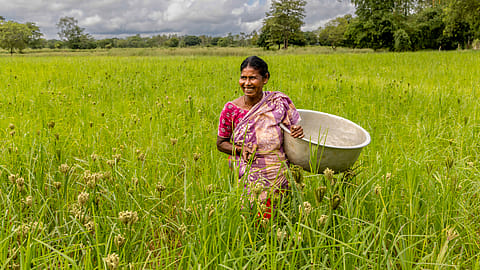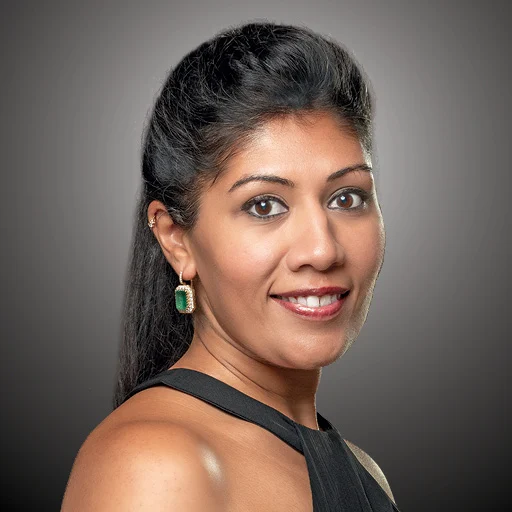Frontier Markets launches India's first climate crop cover for women farmers
The programme will initially cover 5,000 farmers and stands to benefit an estimated 24,000 individuals in its first year.

For years, women in rural Rajasthan and Uttar Pradesh have relied on kerosene lamps, spending a significant portion of their earnings on fuel that emitted harmful fumes. Ajaita Shah, who has spent over 18 years working in rural India, saw an opportunity and stepped in by providing access to affordable, clean energy solutions through its network of women entrepreneurs.
In a bid to address risk mitigation, Frontier Markets, a rural social commerce platform, has partnered with Global Parametrics, a CelsiusPro Group company, to provide women smallholder farmers in India with affordable crop assurance. The programme initially covers 5,000 farmers and stands to benefit an estimated 24,000 individuals in its first year. It marks a first-of-its-kind move in India —a climate insurance product specifically designed for small and marginal women farmers!
Founded in 2011, Frontier Markets began with a simple but ambitious idea: making rural distribution efficient and accessible by leveraging technology and a network of women entrepreneurs. Shah, founder, realised the inefficiencies in last-mile distribution firsthand. “The biggest problem was that rural customers had money and aspiration, but they lacked access to quality products and services,” she explains.
A new way to look at climate impact
For Shah, addressing climate challenges in rural India goes beyond just introducing better farming tools or inputs. “What we see is that there’s three ways of looking at climate,” she says. “One — help the farmer get access to better advisory, get access to better services that can help them actually cultivate their land more effectively. But then also be able to be the climate champion where — because of the way that they’re changing their practices — they’re able to actually help reduce carbon emission.”
The second dimension, she explains, is the transition to clean energy. “Given that you’re working in rural India, you’re able to also bring in clean energy solutions or solar lighting or more energy efficient solutions. Again, carbon reduction has been a big thing that we’ve been able to do on the platform.”
But the third — and arguably the most overlooked — is financial resilience. “At the end of the day, you can design better financial products that will help farmers be more resilient, especially because climate change and climate calamities have been happening over the last decade. We recognise that farmers feed the entire world. If they’re not able to protect or cultivate their land, they’re not going to be effective right on the ground when it comes to it.”
Recommended Stories
It’s a business case at the end of the day. Frontier Markets is positioning itself at the intersection of climate action, gender empowerment, and rural commerce. The company has been able to be a profitable business that has grown year on year by 4-5X. “We’ve reached the masses, we’re using technology and data to understand how farmers and people think, and then we’re being able to design climate-friendly solutions,” Shah says.
Insurance, but designed differently
According to a media statement, the crop insurance product developed through this partnership is built on a parametric model rather than traditional loss-based insurance. Global Parametrics’ drought insurance offering is based on its proprietary Water Balance Index, which measures the balance between rainfall and evaporation over a given time. This model provides an estimate of water availability in a region and helps assess drought conditions without requiring on-ground loss assessments.
Unlike conventional insurance, where claims can take months to process due to the need for physical verification, parametric products provide faster relief. If the Water Balance Index falls below a certain threshold, cash payouts are triggered automatically and transferred directly to the bank accounts of beneficiaries.
(INR CR)
This is especially important in a segment where access to formal financial instruments is already limited. “There’s no climate insurance product for small women farmers — it doesn’t exist,” Shah points out. “We’re literally designing it for the first time ever.”
The gender gap in agri-finance
The challenges go beyond insurance access. Shah points out that women farmers face a systemic disadvantage because of land ownership laws and norms. “Women don’t own land. It’s not under their names. So, even though the agri-solutions they’re cultivating are significant, it’s not seen or tracked in any sort of way,” she says.
One stark example of this is the inability of most women farmers to access Kisan Credit Cards — a key financial tool for Indian farmers — due to lack of land titles in their names. “There’s no money, no credit card, because in order to get a Kisan Credit Card, you need to own the land,” Shah adds.
Despite accounting for 51% of the agricultural workforce in India, women farmers remain invisible to most financial systems. Shah believes the solution lies in designing products with a clear gender lens. “Agri-finance products have not been designed for women because people aren’t paying attention to understand who women are,” she says. “At the end of the day, when you bring in women to understand the needs of women, you can bring in a much stronger gender lens and then design and innovate very differently.”
In its early phase, the insurance programme will be rolled out in Rajasthan and parts of Uttar Pradesh, regions already vulnerable to erratic rainfall and worsening drought patterns. Shah says the initiative will use the existing Sahelis (Frontier Markets’ women entrepreneurs) network to identify and onboard eligible farmers. These women, embedded in their communities, will also play a key role in educating other farmers on how parametric insurance works and how it can be a buffer in times of crisis.
While still in its pilot phase, the partnership between Frontier Markets and Global Parametrics offers a glimpse into how targeted, tech-enabled financial tools could further the cause of building climate resilience — especially for those historically excluded from formal systems.
As climate shocks grow more frequent and intense, the need for such innovations will only increase. Shah is clear-eyed about the work ahead. “If people were to invest differently, the potential is huge,” she says. “It’s not just about supporting women farmers — it’s about rethinking how we build resilience from the ground up.”
